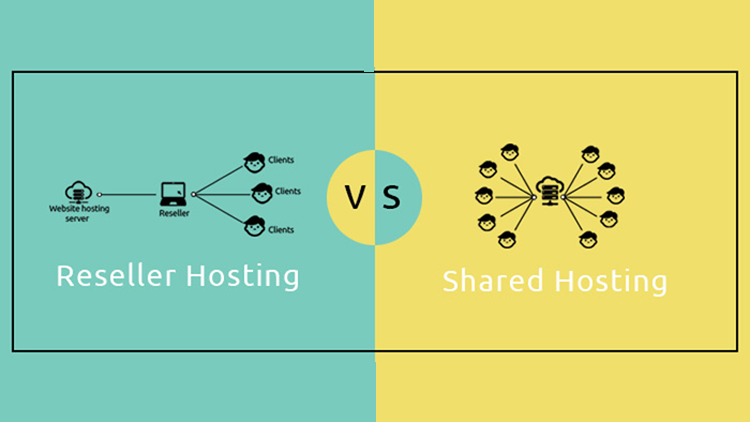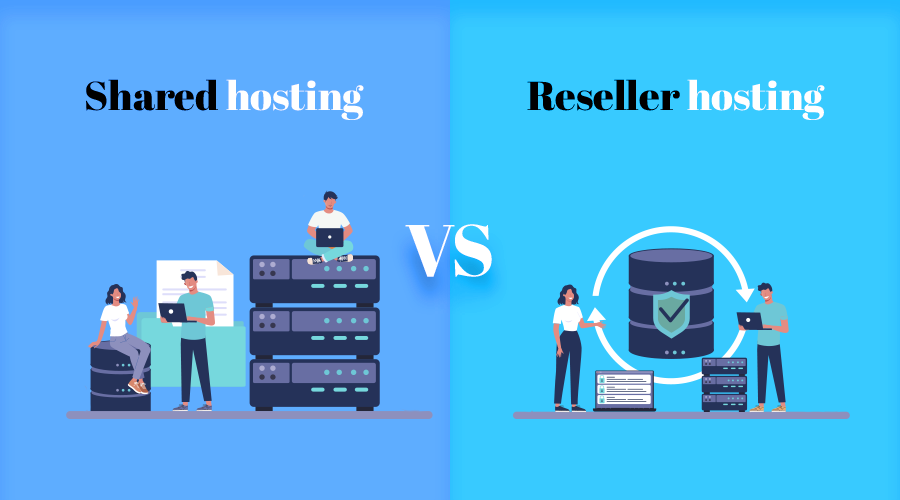Understanding these hosting types is essential for anyone starting out into web hosting or seeking the right hosting solution for their website.
When it comes to web hosting, various options cater to different needs. Two commonly discussed choices are reseller hosting and shared hosting. Knowing the main differences between these options can significantly impact the performance and management of your website.
This guide aims to provide a comprehensive breakdown between reseller hosting and shared hosting. By understansing these differences, you'll be equipped to make informed decisions that align with your hosting requirements and goals.
We`ll delve into the specifics, showcasing the unique attributes, advantages, and ideal use cases for both reseller hosting and shared hosting. Understanding these distinctions is key to determine the best-suited hosting solution for your online business.
What is Shared Hosting?
Shared hosting refers to a web hosting service where multiple websites share a single physical server and its resources. In this setup, numerous users share the server's storage, bandwidth, memory, and other resources. Each website hosted on this server operates independently, but they all utilize the server's resources simultaneously.
Features of Shared Hosting:
Shared hosting is affordable since the cost is distributed among multiple users sharing the server.
Hosting providers handle server maintenance, security, and technical aspects, requiring minimal technical expertise from users.
The server's resources like CPU, RAM, and disk space are shared among multiple websites, impacting performance based on the shared usage.
Users have restricted control over server settings and configurations due to the shared environment.
Pros of Shared Hosting:
Ideal for small websites or beginners due to its budget-friendly nature.
Simplified setup and maintenance, making it convenient for those new to web hosting.
Hosting providers usually offer maintenance and support services, reducing the need for technical skills.
Cons of Shared Hosting:
Resource sharing can lead to slower performance during high-traffic periods or if a neighboring site experiences spikes in traffic.
Restricted server access limits the ability to customize configurations or install certain software.

What is Reseller Hosting?
Reseller hosting is a service where individuals or businesses purchase hosting resources and server space from a hosting provider and then resell these resources to their clients as their own hosting service. Essentially, a reseller buys a hosting package, divides the allocated resources, and sells them to customers under their branding and pricing.
Features of Reseller Hosting
Resellers can customize and brand the hosting service under their own name, logo, and pricing structure.
Resellers can allocate server resources like disk space, bandwidth, and domains to their clients.
Resellers often receive tools and interfaces to manage client accounts, create packages, and set pricing.
Pros of Reseller Hosting:
Enables entrepreneurs to create a hosting business without the infrastructure investment, generating additional income.
Resellers have control over their hosting packages, allowing customization according to client needs.
Starting a hosting business becomes more accessible with lower initial investments.
Cons of Reseller Hosting:
Resellers often rely on the hosting provider for server maintenance, which can affect service quality.
Mismanagement of resources or overselling can lead to performance issues for clients.

Comparing Reseller Hosting and Shared Hosting
Performance:
- Shared Hosting: In shared hosting, resources are divided among multiple users on the same server. While it's cost-effective, high traffic or resource-intensive websites on the same server can impact performance.
- Reseller Hosting: Reseller hosting typically offers better performance since resources are allocated more exclusively. Resellers have control over resource distribution, ensuring better performance for their clients.
Scalability:
- Shared Hosting: Limited scalability due to shared resources. Sites experiencing growth may face limitations.
- Reseller Hosting: More scalable as resellers can allocate resources as needed, allowing for flexibility when clients' needs change.
Cost:
- Shared Hosting: Usually more cost-effective due to shared resources and infrastructure.
- Reseller Hosting: Can be more expensive, considering the added features and control resellers have over the hosting resources.
Security:
- Shared Hosting: Security risks are slightly higher due to shared environments. Vulnerabilities in one site can potentially affect others.
- Reseller Hosting: Offers better security as resellers can implement additional security measures and control which sites they host.
Use Cases: When to Choose Which
Scenarios for Shared Hosting:
- Shared hosting is ideal for personal blogs or small websites that don't anticipate high traffic.
- For those on a tight budget, shared hosting is cost-effective, offering an affordable entry point into hosting.
- Basic websites without resource-intensive features or functionalities work well in shared hosting environments.
Scenarios for Reseller Hosting:
- Reseller hosting suits professionals offering web services, allowing them to provide hosting as part of their packages.
- When small businesses need to host multiple websites or offer hosting to their clients, reseller hosting provides control and customization.
- Reseller hosting is preferable for websites with scalability needs. As businesses grow, reseller hosting allows for resource allocation as needed.

What is the Difference Between Reseller Hosting and Shared Hosting: Key Takeaways
Understanding the distinctions between reseller hosting and shared hosting is key in choosing the right hosting solution. Shared hosting involves multiple websites sharing resources on a single server, often being a more cost-effective and straightforward choice. In contrast, reseller hosting entails leasing server resources and selling them as separate hosting accounts, offering greater control and customization options.
Shared Hosting Highlights
Shared hosting, favored for its affordability and simplicity, provides a cost-effective solution for personal blogs, small-scale websites, or businesses with moderate traffic. It offers pre-configured server settings managed by the hosting provider, making it easy to set up and maintain without requiring advanced technical skills. However, limitations in customization and performance fluctuations due to shared resources can be encountered.
Reseller Hosting Highlights
Reseller hosting, while pricier than shared hosting, empowers users to create and manage multiple hosting accounts under their brand name. This model offers enhanced control, customization options, and the potential to start a hosting business. Ideal for web designers, developers, or agencies looking to offer hosting services as part of their client packages, reseller hosting grants greater flexibility in resource allocation and client management.
Shared Hosting vs. Reseller Hosting: Similarities and Differences
Both hosting models cater to different hosting needs. Shared hosting targets individuals or small businesses seeking budget-friendly hosting with minimal management. Reseller hosting, on the other hand, caters to users wanting more control, scalability, and the potential to develop a hosting business. Understanding these differences aids in selecting the most suitable hosting solution based on budget, control requirements, and future scalability needs.
Conclusion
The choice between reseller hosting and shared hosting ultimately depends on specific needs, aspirations, and future goals. Shared hosting emerges as a reliable and cost-effective choice for individuals or small businesses seeking a straightforward and hassle-free hosting experience. It’s a solid starting point for those not requiring extensive customization or advanced control over server resources.
On the other hand, reseller hosting offers a more tailored and flexible approach, ideal for entrepreneurs, agencies, or businesses aiming to expand into the hosting realm. The ability to brand services, customize plans, and manage multiple accounts grants an edge in the competitive hosting market.
When deciding between these hosting models, factors like budget, control, scalability, and the potential for growth should guide the decision-making process. Shared hosting suits those seeking an easy and budget-friendly solution, while reseller hosting empowers users with control, customization, and the potential to build a hosting business. Understanding these elements ensures a well-informed decision aligning with immediate needs and future aspirations.
What is the primary difference between Reseller Hosting and Shared Hosting?
Shared hosting involves multiple websites sharing resources on a single server, while reseller hosting allows individuals to resell hosting services by dividing server resources into smaller accounts.
Which hosting type is better for a small business?
Shared hosting is often preferred for small businesses due to its cost-effectiveness and simplicity. Reseller hosting, on the other hand, is more suitable if you plan to resell hosting services or need more control over individual client accounts.
Is technical expertise required to start a reseller hosting business?
Basic technical understanding is beneficial, but many hosting providers offer user-friendly interfaces and management tools that simplify the process, making it accessible for beginners.
Can I upgrade from Shared Hosting to Reseller Hosting?
Most hosting providers offer options to upgrade hosting plans. However, transitioning from shared to reseller hosting might involve migrating data and adjusting configurations.

Nadejda Milanova
An experienced Content creator in the field of Search Engine Optimization (SEO) and WordPress. A true proffesional with a Master's degree focused on journalism.
Read more by Nadejda Milanova





